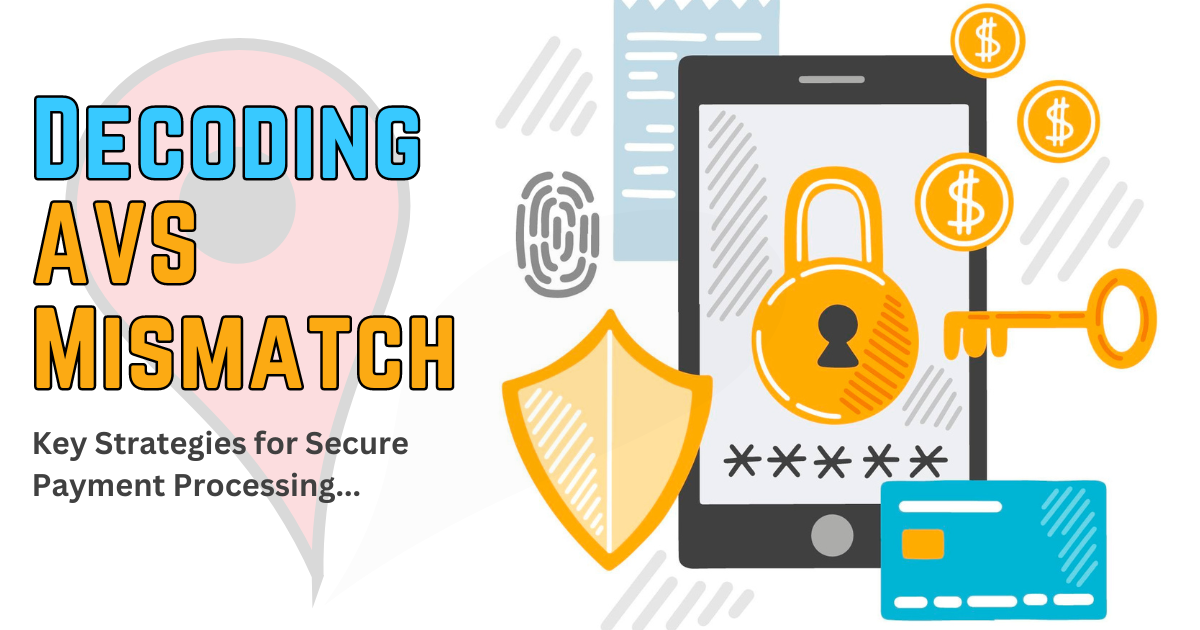
| April 8th, 2024 |
Decoding AVS Mismatch — Key Strategies for Secure Payment Processing!
In today’s digital age, online payment processing is the foundation of e-commerce. However, amidst the simplicity and efficiency it provides, a vital issue is frequently overlooked: Address Verification System (AVS) mismatch. In this detailed article, we’ll look at several aspects of AVS mismatch, its influence on payment processing, and recommended practices for mitigating risks.
Understanding AVS Mismatch —
The Address Verification System (AVS) is a security feature used by financial institutions to ensure the authenticity of cardholders during online transactions. It matches the billing address entered by the cardholder to the address on file with the issuing bank. However, differences between the two can cause an AVS mismatch, suggesting possible fraudulent activity.
Causes of AVS Mismatch —
AVS mismatches can occur for a variety of reasons, including typographical errors, outdated address information, or inconsistencies between billing and delivery addresses. Furthermore, foreign transactions and different formatting standards can both contribute to AVS incompatibilities.
Impact on Payment Processing —
AVS mismatches present substantial issues for businesses, including increased chargeback rates and potential revenue loss. Failed transactions owing to AVS mismatch not only hamper the consumer experience but also decrease the payment system’s reputation. Furthermore, they expose businesses to fraudulent activity and financial losses.
Best Practices for Prevention —
To mitigate the risks associated with AVS mismatches, businesses can implement several best practices:
- Data Validation: Ensure thorough validation of address information at the point of entry to minimize typographical errors.
- Update Address Information: Regularly update address information in your database to avoid discrepancies between billing and shipping addresses.
- Utilize AVS Checks: Enable AVS checks in your payment gateway to verify address details provided by customers.
- Educate Customers: Educate customers about the importance of providing accurate address information to avoid AVS mismatches.
- Implement Fraud Detection Tools: Invest in advanced fraud detection tools and algorithms to identify and prevent fraudulent transactions.
Role in Payment Processing —
AVS mismatches can occur for a variety of reasons, including typographical errors, outdated address information, or inconsistencies between billing and delivery addresses. Furthermore, foreign transactions and different formatting standards can both contribute to AVS incompatibilities.
Enhancing Security:
AVS plays a critical role in enhancing the security of payment processing. By verifying the authenticity of cardholders, AVS helps businesses reduce the risk of fraud. It does this by comparing the billing address provided by the cardholder with the address on file with the issuing bank. Any discrepancies can indicate potentially fraudulent activity, allowing businesses to take necessary precautions.
Detecting Fraudulent Transactions:
One of the primary objectives of AVS is to detect possibly fraudulent transactions. If the address information given by the cardholder differs, AVS might flag the transaction for additional assessment. This assists businesses in identifying and preventing fraudulent transactions, hence avoiding financial losses.
Reducing Chargeback Rates:
AVS can also assist businesses lower their chargeback rates. AVS can help businesses check the legitimacy of transactions by verifying the cardholder’s address information. This reduces the possibility of chargebacks, which may be costly and detrimental to a company’s reputation.
Safeguarding Financial Assets:
AVS helps businesses safeguard their financial assets by detecting discrepancies in address information. This can help prevent unauthorized transactions and protect businesses from financial losses.
Improving Customer Trust:
By implementing AVS, businesses can improve customer trust and confidence in their payment processing systems. Customers are more likely to trust businesses that take steps to verify their identities and protect them from fraud.
Conclusion —
Ultimately, AVS mismatch is a vital part of payment processing that businesses must pay close attention to and take aggressive actions to address. Businesses can improve transaction security and protect themselves from fraudulent activity by understanding the causes and consequences of AVS mismatches and applying effective prevention procedures. You must stay up to date on the newest advances in AVS technology and continually improve payment procedures to provide clients with a seamless and secure payment experience.